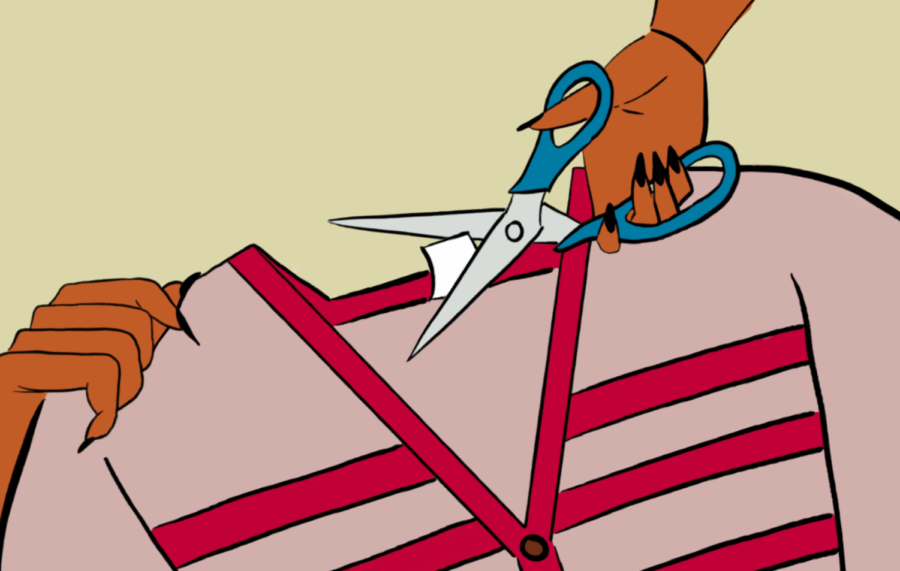clothing tags vs. the fashion industry
It’s 7:30 a.m. and you are getting ready for your 8 a.m. lecture. You decide to throw on an oversized T-shirt and a pair of sweatpants without thinking twice about your outfit or appearance. Next thing you know, you are running around your apartment gathering your laptop, water, tote bag and keys as you fly out the door. You zip into the Rockwell Hall parking lot crossing your fingers that you won’t find a ticket when you return after your lecture is over.
You take a seat right as the professor begins diving into today’s lecture’s PowerPoint. After about 10 minutes of taking notes, you start to feel an itch on the side of your torso. You ignore it and continue typing hoping it’ll go away. Instead, the urge to itch becomes more and more powerful until you cannot take it anymore and decide to give in. With a sigh of relief, you scratch away thinking you’d get rid of the feeling, but two minutes later the itch returns, this time even worse than before.
You start to itch again as your hand grazes a tag attached to your T-shirt in the same exact spot you continue to scratch at. You then realize the irritation is from the tag on the inside of your T-shirt. Throughout the remainder of your lecture, your mind is filled with two thoughts: “Scratch, scratch, scratch!” and “I need to cut off this tag ASAP!”
Now, if you have experienced this same issue caused by a small, annoying clothing tag, I have good news for you. The fashion industry wants them gone as much as you do. In fact, there are efforts being made to get rid of the tags altogether. The American Apparel & Footwear Association (AAFA), an institution that represents more than 1,000 manufacturers and outlets, is leading the effort.
On June 9, 2022, the AAFA sent a letter to the United States Congress and the Federal Trade Commission requesting rules that may allow manufacturers to choose to dispose of bodily labels in apparel if they would like to. Steve Lamar, president and CEO of AAFA, signed the letter which cited three major issues with the physical labels:
(1) The lack of accessibility for sight-impaired consumers or those who have difficulty reading small fonts.
(2) Those with sensitive skin may be irritated by the labels and therefore most likely will remove them. Consequently, mandated information will no longer be available to them or future users.
(3) The proliferation of the tags is created by a large amount of materials, including synthetic fibers and chemical-based inks.
Alternatives
Instead of the itchy clothing tags, manufacturers may connect a QR code or URL, or even come up with a new way to digitally share fiber content, country of origin as well as care commands to customers. The digital labels will also help the industry meet its sustainability needs. On top of that, a digital label will ultimately allow manufactures an easier way to correct outdated or incorrect labeling information more efficiently. Another option could be to print the code directly onto the garment and remove the tags altogether.
In draft legislation titled “Labeling Modernization and Accessibility Act,” the AAFA wrote, “Digital technology, combined with widespread use of smartphones and other digital devices, makes it possible for every mandated and critical labeling requirement, as well as other key information, to be accessible by anybody, anywhere, at any time, delivering critical information, including product recalls, to the consumer in a sustainable, organized, timely, accessible, and easy to understand manner, both before and well after an apparel or textile product is purchased, even if that product is now owned by a new consumer.”
With technology influencing our world more than ever, the fashion industry and economy must continue to adapt to meet the expectations of the consumers at hand. The labeling regime has all the tools it needs to better serve these consumers. All it takes is removing one annoying, scratchy clothing tag one at a time.
Support Student Media
Hi! I’m Catie Pusateri, A Magazine’s editor-in-chief. My staff and I are committed to bringing you the most important and entertaining news from the realms of fashion, beauty and culture. We are full-time students and hard-working journalists. While we get support from the student media fee and earned revenue such as advertising, both of those continue to decline. Your generous gift of any amount will help enhance our student experience as we grow into working professionals. Please go here to donate to A Magazine.







